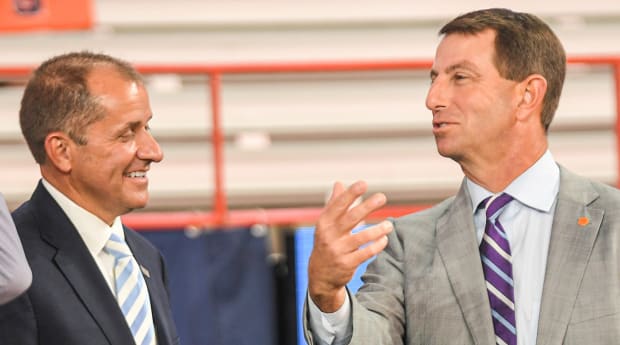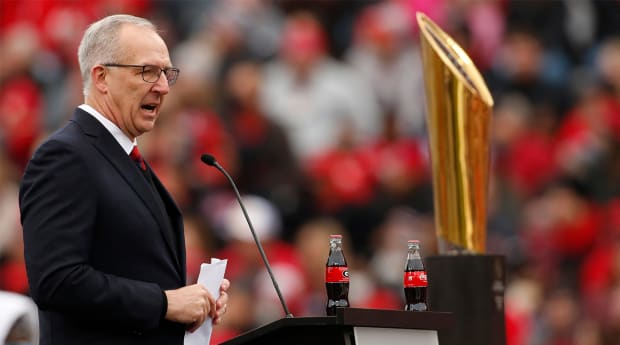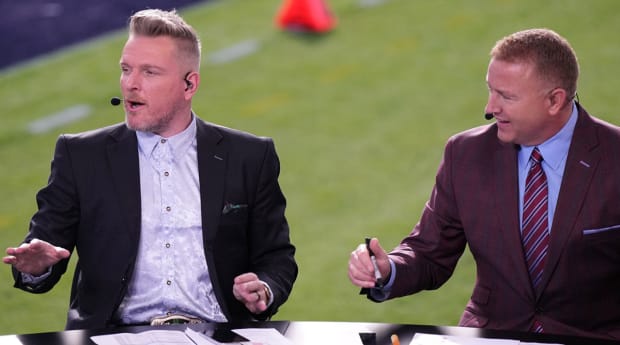Back by popular demand—or force of habit—we present the College Football Most Intriguing Lists. Previous 2023 editions have featured coaches, quarterbacks and nonquarterbacks. This week’s final entry turns away from the playing field to examine the Most Intriguing People in Suits.

Ken Ruinard/USA TODAY Network
1. Jim Phillips, Atlantic Coast Conference commissioner. The shifting realignment drama has settled on Phillips’s league for the foreseeable future. The ACC won a nation-leading nine national championships in 2022–23, but in a world where media-rights revenue dominates all conference decisions this is the hot spot. Although league members are locked into their current agreement until ’36, Florida State (and likely Clemson) seem poised to attempt a breakaway. Meanwhile, Stanford and California have their noses pressed against the ACC window wanting in. Phillips, a career campus administrator with strongly held beliefs about what college sports should look like, has his hands full navigating the next year.
2. Brett Yormark, Big 12 commissioner. The unabashed disruptor pulled off an audacious expansion effort, adding four schools from the Pac-12 and effectively killing that league as a Power 5 entity. Yormark’s maverick approach to conference leadership has helped the Big 12 go from endangered to viable, though he’s unsettled some traditionalists along the way. The cocksure New Yorker has plenty more plans up his sleeve, but first he has to oversee and facilitate adding four schools this year and four more next year—while also losing two tentpole universities in 2024. No conference is undergoing more transformation than his.
3. Tony Petitti, Big Ten commissioner. He’s been riding the tiger since arriving on the job in April. At that time, it appeared that all the heavy lifting had been done by predecessor Kevin Warren, having overseen the addition of USC and UCLA and the signing of the biggest media-rights agreement in history. But less than four months into the job, Petitti was involved in the addition of two more schools for 2024, Oregon and Washington. Now the New Yorker with a broadcast background is going to be leading an unprecedented, 18-team conference that further pushes the envelope on college sports gigantism.
4. George Kliavkoff, Pac-12 commissioner. That’s his job title for now, allegedly leading a league that allegedly still exists. Kliavkoff inherited a tough situation from Larry Scott and made it worse, fumbling media-rights negotiations and presiding over the demise of a 108-year-old conference. Now he has to oversee a ghost conference stumbling through a zombie football season—that, coincidentally, could actually be really good on the field. It’s impossible to see Kliavkoff remaining as a conference commissioner for the long term, but until he books his Southwest Airlines ticket to get away, he’s still on the top of the Pac-12/Pac-4 org chart.
5. Matt Holt, CEO of U.S. Integrity. With gambling scandals engulfing Iowa and Iowa State and ending players’ careers—not to mention the still-unresolved baseball fiasco that has ensnared Alabama, Cincinnati and Xavier—Holt has emerged as a key figure in the wager-monitoring space. His company has contracts with most of the major conferences to monitor and report gambling activity that affects those schools, and U.S. Integrity’s tracking software is precise enough to catch NCAA rules violators red-handed. Holt’s Las Vegas–based outfit has helped pull back the curtain on a huge issue facing college sports. With gambling rampant on campuses nationwide, are Iowa and Iowa State just the beginning?
6. Charlie Baker, NCAA president. Reviews are almost unanimously positive among college sports leaders about Baker during his first year on the job. He’s thrown himself into the task, learned quickly, seized upon major issues and put together an agenda for the future. The question is, how much impact can the former governor of Massachusetts actually have on a multilayered bureaucracy that is slow to change and has little control of football-driven decisions at the conference level? The fact that someone with Baker’s chops is only sixth on this list is indicative of the real-world challenges the NCAA faces as a national authority.
7. Eric Shanks and Burke Magnus, TV executives. Whether you believe they are the puppet masters, the co-conspirators or the coincidental beneficiaries of conference realignment, the CEO of Fox Sports (Shanks) and the president of content at ESPN (Magnus) are neck deep in it. And the rivalry and competition is real between the two networks most invested in college football. While television’s heavy-handed impact on the overall landscape has been damaging in many ways, from a content standpoint the rise of Fox’s Big Noon Kickoff has provided a solid competitor to the powerhouse franchise that is College GameDay.
8. Michael Alford, Florida State athletic director. Are Alford and the Seminoles the agitators who bolt from the ACC, destabilize the 80-year-old conference and ultimately lead to the final consolidation of college athletes into two megapower conferences? To be determined, but don’t bet against it. Some ACC members suspect it’s a matter of days or weeks before FSU declares its intention to leave the league come 2025, even if that comes with massive cost and no clear landing spot. If so, it could be the ultimate heedless act in a trip-wire series of them nationwide.
9. Condoleezza Rice, Stanford advocate. Desperate times call for high-level interventions, and the former Secretary of State, onetime Stanford provost and current professor at the school has come to the aid of the Cardinal as it tries to find a conference home for 2024 and beyond (primarily the ACC). With a power vacuum at the school due to the resignation of president Marc Tessier-Lavigne due to a research scandal, someone has to fill the void. Fortunately for Stanford, they have a lot of high-powered people to call upon. Unfortunately for Stanford, TV execs and conference leaders care more about revenue than academic or political credentials. Rice is emblematic of the school itself at this juncture: respected, smart, influential beyond athletics—but ultimately at the mercy of people who don’t care much about those things.
10. Bubba Cunningham, North Carolina athletic director. Another key figure in the ACC expansion discussions. There are four schools opposed to adding Stanford and California, with two of them seemingly intractable (Florida State and Clemson). The other two are North Carolina and North Carolina State, and several league sources say NC State’s vote would be tied to UNC’s. Cunningham, deemed the best possible candidate to flip and provide the necessary vote to add the Bay Area schools, has been moved off his position so far despite considerable lobbying. Meanwhile, Bubba is beginning the fall sports season with a 71-year-old leading his football program and a 23-year-old leading his reigning national champion field-hockey team.

Joshua L. Jones/USA TODAY NETWORK
11. Greg Sankey, Southeastern Conference commissioner. Should the most powerful person in college athletics really be this low on the list? That’s open to debate, but primarily it signals that the SEC is in a relatively drama-free period, while change rages everywhere around it. The first power conference to announce its expansion to 16 teams two years ago now seems almost quaintly territorial, compared to the mayhem that is shaking the rest of the landscape. If the ACC cracks, the drama will commence again quickly in the SEC—and even without that potential scenario, Sankey will be busy flexing his muscles regarding the makeup of the College Football Playoff in the weeks to come.
12. Kay Norton, NCAA Committee on Infractions chair. On Sept. 1, Norton takes over as chair of the group that will decideat least part of the fate of Michigan coach Jim Harbaugh and others charged in a high-profile case that appeared headed to a negotiated resolution until earlier this month. Harbaugh was on his way to a four-game suspension to start this season, then the COI rejected the negotiated resolution. Then Michigan instituted a three-game suspension for Harbaugh, which still leaves open the possibility for more sanctions in 2024 via a committee hearing. Norton, the smart and tough former president of the University of Northern Colorado, presided over the Tennessee infractions case earlier this summer that resulted in stiff penalties for involved coaches but no postseason ban for the Volunteers.
13. Kurtis Gregory, Missouri state representative. There are 100 different entry points to the evolving world of name, image and likeness and its impact on recruiting—collectives, agents, marketers, U.S. senators, etc. But Gregory presents a particularly interesting and pertinent element. The former Mizzou offensive lineman turned politician was one of the authors and sponsors of a state law that allows high school athletes to receive NIL compensation before they set foot on campus if they sign with an in-state school. This likely assumes real-world significance with the verbal commitment of defensive end Williams Nwaneri, a national top-five recruit, to the home-state Tigers over Georgia and Oklahoma. The turf battle between state laws, NCAA regulations and the wishes of the SEC—which does not love having a league with a hodgepodge of disparate regulations—is a fascinating one to monitor.
14. Rick George, Colorado athletic director. Nobody has leveraged 2023 like George, who presides over one of the worst Power 5 football programs in the U.S. but has charted a bold (potentially reckless) course for the future. George hired Deion Sanders from the FCS coaching ranks, welcoming the PR maelstrom that comes with Coach Prime. He gave Sanders the imprimatur to overhaul the roster to an unprecedented degree, running players off and tapping the transfer portal like no coach ever has. And then he knocked over the first ’23 domino in the destruction of the Pac-12, bolting from the conference for the Big 12 before even waiting to see Kliavkoff present the terms of a new media-rights deal. None of this necessarily makes the Buffaloes good at football, but it damn sure makes them interesting.
15. Pac-4 athletic directors. The poor souls left behind in the atomization of a Power 5 conference are contemplating a host of less-than-ideal options while trying to decide whether they’re actually all in this together. Stanford AD Bernard Muir and California’s Jim Knowlton might have more options than counterparts Scott Barnes of Oregon State and Pat Chun of Washington State, but they also have more to lose. They lead powerhouse programs in Olympic sports and represent elite academic institutions, but so far that hasn’t gotten them anywhere in terms of a desirable new location. Meanwhile, the Beavers and Cougars are doing their best to market themselves as relevant, with or without their Bay Area brethren. They’re all involved in a high-stakes, high-stress race against the clock.
16. Amy Perko, Knight Commission. With football dragging all of college sports into a new era of unapologetic greed, the CEO of a group that has promoted reforms to the industry for nearly 35 years is resubmitting a well-researched idea from 2020. The Knight Commission is advocating for football to be siloed separately from the rest of a school’s sports, a concept that was ahead of its time nearly three years ago but is increasingly being discussed now after the demolition of the Pac-12. The former star guard at Wake Forest worked at the NCAA for six years; now she’s trying to help get the association ahead of the myriad challenges it faces. And none is bigger than football warping the rest of the enterprise around its relentless revenue quest.
17. Jeff Nelson and Kevin Pauga, scheduling gurus. Nelson, the president of Navigate, and Pauga, a Michigan State associate athletic director with an algorithm-based side gig called Faktor, have become go-to consultants in the increasingly complicated world of scheduling megaconferences. Administrators trying to devise something remotely fair and efficient for an 18-team Big Ten or the 16-team SEC and Big 12 need all the help they can get when it comes to scheduling. The challenges are not just creating slates that have something resembling competitive balance but also accounting for escalating travel distances. The devil is in the week-to-week details, and several major conferences are going to find out in 2024.
18. Kerry Kenny, Big Ten chief operating officer. Kenny was elevated to COO recently, and the rising star in conference administration has a big job ahead of him as the office’s primary schedule contact. He’s now working with the largest league in FBS history, and the most far-flung. And all the careful work that went into planning and releasing that 16-team football slate for 2024 back in June was wadded up and thrown out the window earlier this month. The league goes back to the drawing board this week with its first meeting to discuss the reformulated ’24 slate—and it better be a big drawing board.
19. Gary Danielson, CBS Sports analyst. This is a full-circle season for Danielson, a former Purdue quarterback who became a fixture calling SEC games and now will be back in the Big Ten at least part time. (CBS will air both SEC and Big Ten games this season before fully transitioning to the Big Ten.) For years, Danielson was as much a part of the 3:30 ET SEC showcase as Nick Saban—sometimes drawing the ire of fans elsewhere who perceived him to be an SEC homer. NBC is also part of the new Big Ten broadcast lineup, with the network jumping into the prime-time broadcasting window. We’ll see whether the network can replicate the production (and ratings) magic it has worked with NFL Sunday night broadcasts.

Kirby Lee/USA TODAY Sports
20. Pat McAfee, ESPN analyst. The former West Virginia kicker-punter has made the biggest broadcasting impact of any kicker since Pat Summerall, and there’s no telling what heights the 36-year-old bundle of energy might eventually reach. (Maybe tank tops will replace coats and ties on live sets everywhere.) Added last year to the GameDay set, McAfee quickly changed the dynamic of the show with his off-the-wall approach. Then this past spring, at a time when the World Wide Leader was whacking longtime staffers, it spent a fortune to bring McAfee’s daily talk show onboard. It will debut Sept. 7.
21. Derrick Gragg, Northwestern athletic director. The first coaching search of the 2023 season belongs to Gragg, provided he keeps his job long enough to conduct it. How much of Northwestern’s hazing mess might have transpired in Gragg’s two years at the school is unknown, but this is known—he’s part of an administration that has fumbled virtually every aspect of the scandal that cost longtime coach Pat Fitzgerald his job. Hiring the next coach could be a wild ride: a new stadium is in the works, albeit with fresh concerns about funding after Fitzgerald was ousted; a transfer exodus seems likely after the season; Fitzgerald could seek a wrongful termination suit against Northwestern, and he still has plenty of supporters in the fan base. Gragg’s one football hire during his tenure at Tulsa, Philip Montgomery, was dismissed after last season with the worst winning percentage at the school since Keith Burns from 2000–02.
22. Jack Swarbrick and Gene Smith, outgoing athletic directors. Two of the strongest voices and most respected administrators in college sports are entering their final football seasons in their current positions, Swarbrick at Notre Dame and Smith at Ohio State. Swarbrick has some big meetings ahead this fall in his position with the College Football Playoff, which must decide whether to reformat its 2024 and ’25 agreement to allot six bids to conference champions and six more to at-large teams—the implosion of the Pac-12 has thrown that into doubt. Smith is hoping he doesn’t watch his football coach slip to a losing record against Michigan, after Ryan Day started 2–0 in the rivalry and has been thumped in successive seasons.
23. Darryll Pines, Maryland president. Pines, a Black man, is atop an organizational chart that includes a Black athletic director (Damon Evans) and a Black head football coach (Mike Locksley). Locksley’s top three assistants (offensive coordinator Josh Gattis, defensive coordinator Brian Williams and strength coach Ryan Davis) also are Black. At the Power 5 level, that’s an unprecedented alignment of Black leadership in a sport where the racial makeup of the locker room is rarely duplicated among the decision-makers. The Terrapins are coming off an 8–5 season in which they recorded their highest Sagarin Rating (No. 37) since 2003.







